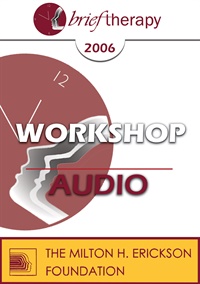
- Average Rating:
- Not yet rated
- Topic Areas:
- Workshops | Hypnosis | Experiential Therapy | Brief Therapy | Homework
- Categories:
- Brief Therapy Conference | Brief Therapy Conference 2006
- Faculty:
- Jeffrey Zeig, PhD
- Duration:
- 1:58:24
- Format:
- Audio Only
- Original Program Date:
- Dec 10, 2006
- Short Description:
- An experiential orientation empowers therapeutic change. Dramatic experiential methods can be used by any clinician in every stage of the therapeutic process including assessment, in session treatment and homework assignments. Techniques to be demonstrated and practiced include therapist sculpting, symbolic assignments and analogical tasks.
- Price:
- $15.00 - Base Price

- Average Rating:
- Not yet rated
- Topic Areas:
- Workshops | Brief Therapy | Experiential Therapy | Therapist Development
- Categories:
- Brief Therapy Conference | Brief Therapy Conference 2006
- Faculty:
- Jeffrey Zeig, PhD
- Duration:
- 2:21:51
- Format:
- Audio Only
- Original Program Date:
- Dec 10, 2006
- Short Description:
- This "playshop" will consist of experiential clinician development exercises. While it is widely agreed that the person of the therapist is central to patient change, there are limited methods for developing ways to BE a therapist. This program centers on eliciting and developing therapist acuity. Dr. Zeig will present a systemic modeling method that can be easily transferred to make therapy and supervision more powerfully experiential.
- Price:
- $15.00 - Base Price

- Average Rating:
- Not yet rated
- Topic Areas:
- Clinical Demonstrations | Brief Therapy | Experiential Therapy
- Categories:
- Brief Therapy Conference | Brief Therapy Conference 2008
- Faculty:
- Jeffrey Zeig, PhD
- Duration:
- 53:21
- Format:
- Audio Only
- Original Program Date:
- Dec 13, 2008
- Short Description:
- BT08 Clinical Demonstration 01 - Experiential Applications for Brief Therapy - Jeffrey Zeig, Ph.D.
- Price:
- $15.00 - Base Price
Tags: Brief Therapy Experiential
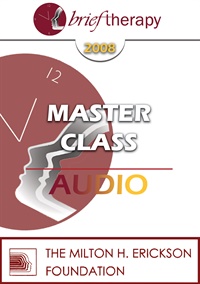
- Average Rating:
- Not yet rated
- Topic Areas:
- Master Classes | Brief Therapy | Experiential Therapy | Gestalt | Hypnosis | Ericksonian Hypnosis and Therapy Techniques
- Categories:
- Brief Therapy Conference | Brief Therapy Conference 2008
- Faculty:
- Jeffrey Zeig, PhD | Erving Polster, PhD
- Duration:
- 3:13:17
- Format:
- Audio Only
- Original Program Date:
- Dec 15, 2008
- Short Description:
- Gestalt therapy and Ericksonian hypnotherapy are experiential methods of change. In combination they can be synergistic. Psychotherapy is best when clients have a first hand experience of an alive therapeutic process. Such dynamic, empowering experiences pave the way for dynamic understandings. Drs. Polster and Zeig will offer brief introductions to their approaches. They will demonstrate their methods through live therapeutic sessions and they will engage with each other and the participants to examine commonalities and differences in their work.
- Price:
- $15.00 - Base Price
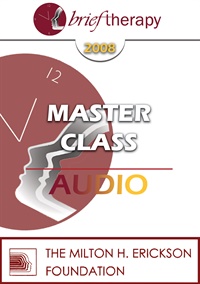
- Average Rating:
- Not yet rated
- Topic Areas:
- Master Classes | Brief Therapy | Experiential Therapy | Gestalt | Hypnosis | Ericksonian Hypnosis and Therapy Techniques | Hypnotherapy
- Categories:
- Brief Therapy Conference | Brief Therapy Conference 2008
- Faculty:
- Jeffrey Zeig, PhD | Erving Polster, PhD
- Duration:
- 2:31:17
- Format:
- Audio Only
- Original Program Date:
- Dec 15, 2008
- Short Description:
- Gestalt therapy and Ericksonian hypnotherapy are experiential methods of change. In combination they can be synergistic. Psychotherapy is best when clients have a first hand experience of an alive therapeutic process. Such dynamic, empowering experiences pave the way for dynamic understandings. Drs. Polster and Zeig will offer brief introductions to their approaches. They will demonstrate their methods through live therapeutic sessions and they will engage with each other and the participants to examine commonalities and differences in their work.
- Price:
- $15.00 - Base Price
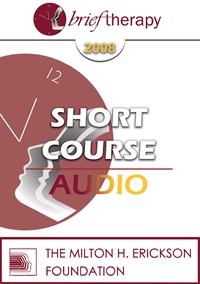
- Average Rating:
- Not yet rated
- Topic Areas:
- Short Courses | Attachment | Experiential Therapy | Psychotherapy | Brief Therapy
- Categories:
- Brief Therapy Conference | Brief Therapy Conference 2008
- Faculty:
- Hanna Levenson, PhD
- Duration:
- 1:01:35
- Format:
- Audio Only
- Original Program Date:
- Dec 11, 2008
- Short Description:
- A model of brief therapy incorporating current developments in psychodynamic, interpersonal, attachment, experiential, and systems approaches will be presented. This approach is designed to be of help with the so-called difficult client who has chronically dysfunctional ways of relating to others. Videotaped segments of actual sessions will illustrate formulation and intervention strategies.
- Price:
- $15.00 - Base Price
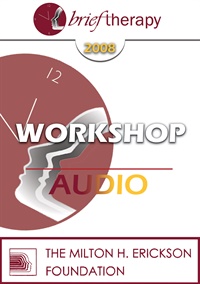
- Average Rating:
- Not yet rated
- Topic Areas:
- Workshops | Brief Therapy | Experiential Therapy
- Categories:
- Brief Therapy Conference | Brief Therapy Conference 2008
- Faculty:
- Stephen Karpman, MD
- Duration:
- 1:20:33
- Format:
- Audio Only
- Original Program Date:
- Dec 14, 2008
- Short Description:
- Patients enter therapy trapped in games far too complicated to solve by themselves. The therapist offers insights by simplifying the double and triple roles in the Drama Triangle, and offers clear choices by simplifying the possible escape routes to use. An experiential exercise is included.
- Price:
- $15.00 - Base Price
Tags: Brief Therapy Experiential
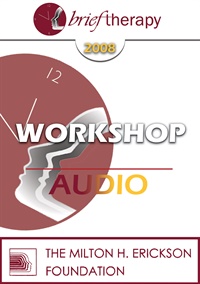
- Average Rating:
- Not yet rated
- Topic Areas:
- Workshops | Art and Creativity | Brief Therapy | Experiential Therapy | Psychology
- Categories:
- Brief Therapy Conference | Brief Therapy Conference 2008
- Faculty:
- Jeffrey Zeig, PhD
- Duration:
- 2:04:07
- Format:
- Audio Only
- Original Program Date:
- Dec 14, 2008
- Short Description:
- Changing mood and perspective is central in brief therapy. Experiential methods can be more immediately effective than traditional didactic approaches. All art is, by definition, "experiential." Altering mood and perspective is the point of it - whether drama, painting, literature, dance or music. Movies use multilayered methods for change. The viewer is often unaware of the intricate dramatic, experiential techniques that filmmakers use to exert influence. Social psychology studies the way in which people are influenced outside of awareness.
- Price:
- $15.00 - Base Price
BT10 Clinical Demonstration 01 – Increasing Impact in Experiential Psychotherapy - Jeffrey Zeig, PhD
- Average Rating:
- Not yet rated
- Topic Areas:
- Clinical Demonstrations | Psychotherapy | Experiential Therapy
- Categories:
- Brief Therapy Conference | Brief Therapy Conference 2010
- Faculty:
- Jeffrey Zeig, PhD
- Course Levels:
- Master Degree or Higher in Health-Related Field
- Duration:
- 52:20
- Format:
- Audio and Video
- Original Program Date:
- Dec 11, 2010
- Short Description:
- Educational Objectives: List three essentials of experiential therapy. Given a patient with a behavior problem, create an experiential treatment plan to elicit change.
- Price:
-
Sale is $29.00
price reduced from Base Price - $59.00
Tags: Experiential Psychotherapy
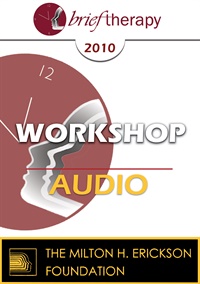
- Average Rating:
- Not yet rated
- Topic Areas:
- Workshops | Experiential Therapy | Brief Therapy | Therapist Development
- Categories:
- Brief Therapy Conference | Brief Therapy Conference 2010
- Faculty:
- Lilian Borges, MA, LPC
- Duration:
- 2:19:53
- Format:
- Audio Only
- Original Program Date:
- Dec 09, 2010
- Short Description:
- In this workshop we will learn how to provide effective experiential treatment rather than offering didactic information or treatment protocols. We can enter the patient’s phenomenological world -- even with the most difficult patients. Lilian Borges will demonstrate an integrative approach that is brief, experiential, phenomenological, and effective. Therapist sculpting allows the therapist attune to the client’s experience; empathize with them; help the client to disengage from the problem; focus on what is important; and help the client discover new possibilities.
- Price:
- $15.00 - Base Price
Please wait ...


